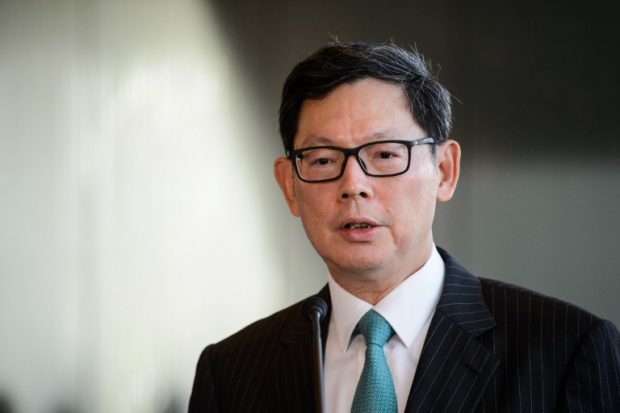
In this file photo taken on June 24, 2016, Hong Kong Monetary Authority (HKMA) Chief Executive Norman Chan holds a press conference in Hong Kong. AFP
HONG KONG, China — The head of the Hong Kong’s de-facto central bank, Norman Chan, will step down this year after a decade in the post that saw him oversee the city’s recovery from the global financial crisis as well as a ballooning property market.
Local reports cited sources as saying the government would likely to promote one of his three deputies to take over at the helm of the Hong Kong Monetary Authority when Chan retires in October.
His successor will come in facing a number of challenges including the impact of China’s stuttering economy and how to address a housing crisis caused by a stratospheric rise in property prices.
However, they can expect a healthy remuneration, with Chan earning HK$10.8 million in 2017 making him one of the world’s best paid central bankers.
With HKMA monetary policy linked to that of the Federal Reserve owing to their currency peg, record low interest rates in the US during the recovery fanned a surge in costs to make Hong Kong the world’s most expensive housing market.
While Chan has introduced a number measures to keep it from rising further, but mostly to no avail.
During his tenure the HKMA has also been forced to step in to the currency markets to maintain the local dollar’s decades-old peg to the greenback.
Among the biggest interventions was in July and August 2014 when it stepped in 24 times, injecting a total of US$9.7 billion into the financial system as the local dollar surged against the US unit owing to a flood of cash seeking access to China’s booming market.
The latest was last year, when the Hong Kong dollar weakened to the bottom end of its 7.75-7.85 trading band, prompting HKMA to buy billions of US dollars worth of the local currency.
The 2018 interventions led to hike commercial borrowing costs for the first time in 12 years.
Chan has also had to defend the link, with critics including former HKMA boss Joseph Yam previously calling for a review saying it left the city at the mercy of the Fed. /ee